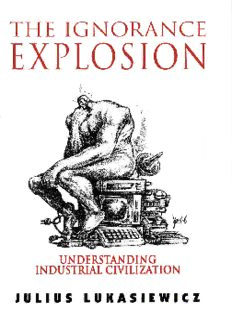
The Ignorance Explosion: Understanding Industrial Civilization PDF
Preview The Ignorance Explosion: Understanding Industrial Civilization
THE IGNORANCE EXPLOSION Understanding Industrial Civilization This page intentionally left blank THE IGNORANCE EXPLOSION Understanding Industrial Civilization JULIUS LUKASIEWICZ Carleton University Press Ottawa, Canada 1994 © Julius Lukasiewicz, 1994 Printed and bound in Canada Canadian Cataloguing in Publication Data Lukasiewicz, J. The ignorance explosion : understanding industrial civilization Includes bibliographical references and index. ISBN 0-88629-234-4 (bound) - ISBN 0-88629-237-9 (pbk.) 1. Technology-Social aspects. 2. Civilization, Modern-20th century. I. Title. CB78.L851994 303.48'3 C94-900171-6 Carleton University Press Distributed in Canada by 160 Paterson Hall Carleton University Oxford University Press Canada, 1125 Colonel By Drive 70 Wynf ord Drive, Ottawa, Ontario Don Mills, Ontario, K1S 5B6 Canada. M3C 1J9 (613) 788-3740 (416) 441-2941 Cover concept: Julius Lukasiewicz Cover design: Y Graphics, Julius Lukasiewicz Typeset by: Carleton Production Centre, Nepean Acknowledgments Carleton University Press gratefully acknowledges the support extended to its publishing programme by the Canada Council and the financial assistance of the Ontario Arts Council. The Press would also like to thank the Department of Canadian Heritage, Government of Canada, and the Government of Ontario through the Min- istry of Culture, Tourism and Recreation, for their assistance. To the memory of my wife HALINA V This page intentionally left blank Contents List of illustrations, xi List of tables, xiii List of "boxes", xv Designation of references, xvii Abbreviations, xix Preface, xxi Acknowledgements, xxv Introduction, xxvii 1. The paradox of human progress, 1 Notes, 10 2. Humanities, social and physical sciences: the two cultures, 11 The cultural gap, 13 The issue of accessibility, 14 The psychological gap, 16 Traditional culture and education, 17 The inescapable predicament of social sciences, 20 The ineradicable gap, 28 Notes, 29 References, 29 Appendix: Some gems of obfuscatory (sociological and other) jargon, 31 3. Technology: the land of many faces, 35 The critics of technology, 37 Embracing the unknown, 42 The blessings and curses of industrial civilization, 56 vn CONTENTS Technology: a domain unique to the human species, 57 Extension of human capabilities, 58 People: the inhumane users of technology, 60 The dehumanizer and depersonalizer, 66 Technology the unforgiving, 72 The agent of constant change, 74 Population, environment and resources, 78 The causes of suffering, 82 The benefits of democratic industrialization, 84 The Third World and the West: the precarious gap, 88 Difficulties in the West, 102 Notes, 104 References, 108 4. The ignorance explosion, 111 Human intellectual capacity, 113 The growth of science, 115 Specialization, 118 The complexity of science and the environment, 119 The immediacy and obsolescence of information, 120 The vanishing grasp, 121 New tools and techniques, 123 Some future limitations, 130 Superhumans and superscience, 133 Notes, 140 References, 140 Appendix: On estimating the magnitude of complexity, 143 5. The brave new world of globalization, 145 The origins, 147 A historical perspective, 148 Continental integration: the United States, 150 Science: a precursor of globalization, 152 Toward a voluntary federation of nations, 152 A rough road to European Union, 155 Globalization of industrial operations, 161 Internationalization of labour, 167 Environmental challenge to sovereignty, 169 The relentless progress of globalization, 171 Notes, 171 References, 172 vm CONTENTS 6. Language in the service of identity— or communication?, 175 Latin: a historical illustration, 178 The communication imperative: India and Africa, 179 The communication imperative: China and Japan, 180 Toward efficient spelling, 184 English as the modern lingua franca, 185 The early imperatives of communication, 186 Science, 187 Diplomacy, international organizations, business and education, 190 Global audience and standards, 191 Internationalization of vocabularies and lifestyles, 197 Preservation of linguistic identity, 201 Toward a common language, 209 Notes, 211 References, 212 7. Technology and war, 213 Nuclear weapons: what are they good for?, 217 The Maginot Line of the space age, 222 The missile systems game, 226 The supreme deterrent, 228 What makes deterrence effective?, 230 Containing the arms race, 232 The need for "minimal deterrent", 233 Notes, 234 References, 234 8. Jettisoning the harness of biology, 237 Prolonging life — or death?, 239 Playing God, 241 The tyranny of sexual gratification, 247 Notes, 249 9. Has vision been lost?, 251 Notes, 259 References, 260 Indexes, 261 Subject Index, 261 Name Index, 270 IX
Description: